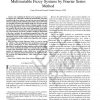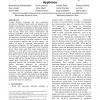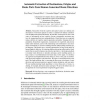1018 search results - page 43 / 204 » Generative unbinding of names |
TSMC
2002
13 years 8 months ago
2002
By exploiting the Fourier series expansion, we have developed a new constructive method of automatically generating a multivariable fuzzy inference system from any given sample set...
INFOCOM
2007
IEEE
14 years 3 months ago
2007
IEEE
Next-generation high-end Network Processors (NP) must address demands from both diversified applications and ever-increasing traffic pressure. One major challenge is to design an e...
INFOCOM
2003
IEEE
14 years 2 months ago
2003
IEEE
Abstract— The third-generation (3G) wide area wireless networks and 802.11 local area wireless networks possess complementary characteristics. 3G networks promise to offer always...
CIDR
2007
13 years 10 months ago
2007
Though database technology has been remarkably successful in building a large market and adapting to the changes of the last three decades, its impact on the broader market of inf...
GISCIENCE
2010
Springer
13 years 10 months ago
2010
Springer
Researchers from the cognitive and spatial sciences are studying text descriptions of movement patterns in order to examine how humans communicate and understand spatial informatio...



